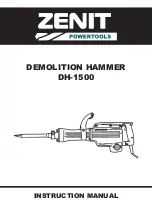
2 609 932 532 | (25.7.07)
Bosch Power Tools
20
| English
Offsetting the Base Plate (see figure D)
For sawing close to edges, the base plate
7
can
be offset to the rear.
–
Completely unscrew the screw
14
using the
Allen key
3
.
–
Take the base plate
7
off and remount it offset
again so that the screw
14
can be screwed in-
to the rear bolt hole
16
.
–
Push the base plate
7
toward the positioning
pin/mark
17
until it engages. Now, tighten the
screw
14
again.
Sawing with the base plate
7
offset is possible
only with a mitre angle of 0°. In addition, the par-
allel guide with circle cutter
20
(accessory) as
well as the splinter guard
12
may not be used.
Sawdust Blower Device
With the air jet of the sawdust blower device
5
,
the cutting line can be kept free of dust and
chips.
Contact Protector
The contact protector
10
attached to the casing
prevents accidental touching of the saw blade
during the working procedure and may not be re-
moved.
Starting Operation
f
Observe correct mains voltage! The voltage
of the power source must agree with the
voltage specified on the nameplate of the
machine. Power tools marked with 230 V can
also be operated with 220 V.
Switching On and Off
To
start
the power tool, push the On/Off switch
4
forwards.
To
switch off
the machine, push the On/Off
switch
4
toward the rear.
Presetting the Stroke Rate
With the thumbwheel for stroke rate preselec-
tion
2
, the stroke rate can be preset and changed
during operation.
The required stroke rate is dependent on the ma-
terial and the working conditions and can be de-
termined by a practical trial.
Reducing the stroke rate is recommended when
the saw blade engages in the material as well as
when sawing plastic and aluminium.
After longer periods of work at low stroke rate,
the machine can heat up considerably. Remove
the saw blade from the machine and allow the
machine to cool down by running it for approx.
3 minutes at maximum stroke rate.
Operating Instructions
f
When working small or thin work pieces, al-
ways use a sturdy support or a saw table (ac-
cessory).
Check wood, press boards, building materials,
etc. for foreign objects such as nails, screws or
similar, and remove them, if required.
Plunge Cutting (see figure E)
f
The plunge cutting procedure is only suita-
ble for treating soft materials such as wood,
plaster board or similar! Do not work metal
materials with the plunge cutting procedure!
Use only short saw blades for plunge cutting.
Plunge cutting is possible only with the mitre an-
gle set at 0°.
Sawdust-blower setting
I:
Low blow effect for sawing in metal and
operation with coolant/lubricant.
Sawdust-blower setting
II:
Medium blow effect for sawing materials
with low chip removal rate, e. g., hard-
wood.
Sawdust-blower setting
III:
Large blow effect for sawing materials
with high chip removal rate, e.g., soft-
wood, plactic, etc.
1
–2: Low stroke rate
3
–4: Medium stroke rate
5
–6: High stroke rate
OBJ_BUCH-441-001.book Page 20 Wednesday, July 25, 2007 7:37 AM
















































